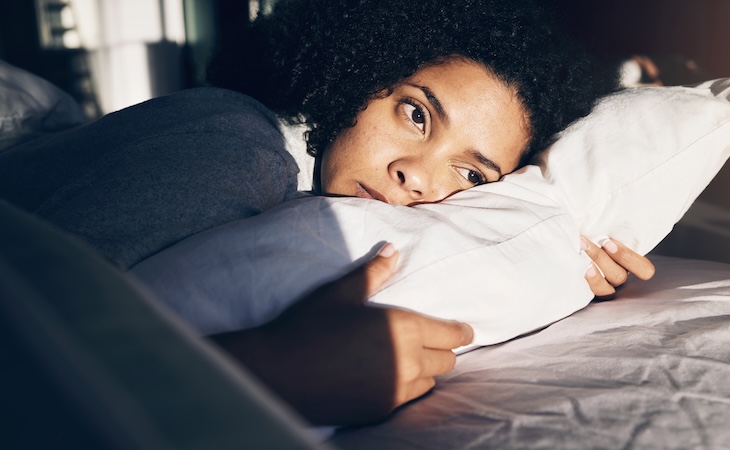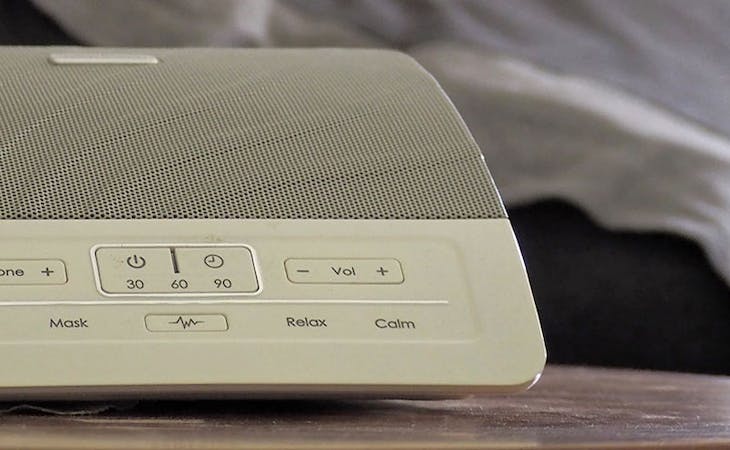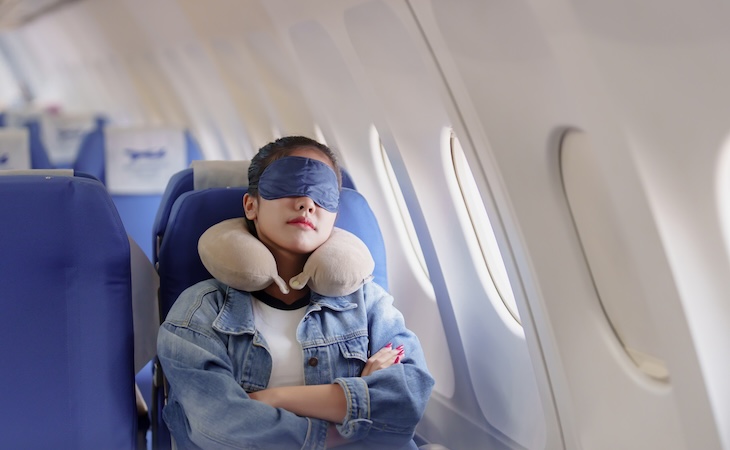
Noise can have a significant impact on sleep quality. White noise, which is consistent across all hearable frequencies, can help mask disruptive sounds and improve sleep. Pink noise, which has louder bass frequencies, may also boost memory. White noise machines can be beneficial for babies and travelers.
In previous posts, we’ve looked at the way light, temperature, and what you eat and drink affect how well you sleep. But there’s another big factor that can impact sleep quality: noise. To create the best conditions for restful slumber, you need to consider your “sound environment” as well as your other surroundings.
Typically, we equate noise with disruption. (One partner’s snoring, for example, is a big reason why some couples choose to sleep apart.) In the case of white noise, though, it’s just the opposite: White noise can not only help you fall asleep, but it can also help you stay asleep.
How white noise works
What is white noise, exactly? White noise is different from the ambient sounds of rainstorms, chirping birds, and rolling waves (though those can be relaxing too). Technically, white noise is sound that remains consistent across all hearable frequencies. That consistency creates a masking effect, blocking out the sudden changes in noise—like, for instance, the aforementioned snoring, or the dog barking, or a truck rumbling down the street—that can cause you to wake up during the night.
And even if you are awakened, the soothing quality of white noise can make it easier for you to fall back asleep. Raj Dasgupta, MD, assistant professor of clinical medicine and sleep expert at Keck Medicine of USC, likens it to the soft, steady glow of a night light, versus the disruption of an overhead light switched on and off. In an interview with Prevention, Dasgupta notes that there is “limited science” confirming the benefits of white noise for sleep, but if you’re sensitive to noise, it’s definitely worth a try. (Just make sure to rule out other causes, he advises, such as sleep apnea or another sleep disorder.)
A white noise study reported in the Journal of Caring Sciences found that patients in a hospital coronary care unit who had white noise broadcast in their rooms experienced more and better quality sleep than those who didn’t. The researchers concluded that the white noise was able to mask environmental sounds, help patients fall asleep, and stay asleep even in a noisy hospital environment.
A similar experiment with healthy people who suffered from insomnia yielded equally encouraging results. Frontiers in Neurology reported that 18 healthy subjects exposed to broadband sound (white noise falls into this category) experienced a 38% reduction in “sleep latency”—i.e., the time they spent tossing and turning before drifting off—and when they did fall asleep, showed “subjective and objective” improvements in sleep quality.
Is pink noise the new white noise?
Along the same lines as white sound lies another type of broadband sound, pink noise, is getting a lot of press because recent studies suggest that not only does it contribute to better sleep, but it may also boost your memory.
Pink noise can be described as “white noise with the bass turned up.” Whereas white noise is perfectly balanced across all frequencies, in pink noise the bass frequencies are louder, with the higher frequencies turned down.
Scientists have known that acoustic stimulation methods applied during sleep in young adults can increase slow wave activity (SWA)—so-called “deep sleep“—and improve sleep-dependent memory retention. They wondered: Could it help older people, too?
Northwestern University neuroscientists and neurologists sought to answer that question, reporting in Frontiers in Human Neuroscience on 13 individuals between the ages of 60 and 84 who were subjected to pulses of pink noise while they slept at night. Afterward, the participants completed memory tests.
Participants’ memory was three times sharper after sleeping with pink noise. They also seemed to enjoy longer periods of deep sleep. Phyllis Zee, MD, PhD, one of the researchers, said the study suggests that pink noise may be “an innovative, simple, and safe non-medication approach that may help improve brain health.” (Learn about green noise and whether it can help you sleep better.)
White noise for babies
It’s not just adults who can benefit from white noise in the bedroom. A 1990 study published in the Archives of Disease in Childhood found that white noise could be helpful in getting babies to sleep too. Eighty percent of the 40 newborns studied were able to fall asleep after five minutes of hearing white noise. Some white noise machines even feature a heartbeat setting that comforts the newborn by sounding like Mom.
If you’re tempted to put a white noise machine in a child’s room, pay special attention to the decibel level. When the American Academy of Pediatrics (AAP) in 2014 tested more than a dozen white noise machines designed for infants, it found that they all exceeded the recommended noise limit of 50 decibels. For that reason, the AAP suggests placing a white noise machine at least seven feet away from a baby’s crib and keeping the volume on a low setting.
White noise for travelers
White or pink (or blue or brown, for that matter), the noise you choose can help shut down your busy brain and help you fall and stay asleep.
Maybe one of the best things about a white noise machine—or “sound conditioner” if you’re fancy—is you can take it with you when you travel. Say goodbye to the noise of slamming hotel doors wrecking your sleep the night before the important meeting. (Check out these sleep tips for the global traveler.)
Michael Breus, PhD, a clinical psychologist and fellow of the American Academy of Sleep Medicine, recommends the iHome Zenergy Sleep System (he’s a consultant for iHome), which combines white or pink noise with calming lighting. (On his blog, Breus notes that white noise can also be a helpful sleep treatment if you have tinnitus, a constant ringing in your ears.)
Meanwhile, the Homedics White Noise Sound Machine is an affordable option available on Amazon. If you’re traveling and don’t want to lug a white noise machine with you, you can also install the White Noise app on your phone.
How to use a noise machine to help you sleep
Whether you go for constant white noise, pink noise, or nature sounds that aren’t technically either one, placement is key. Somewhere on the floor may be better for a white noise machine than on the nightstand or under your pillow. The reason? Simple: You don’t want your noise machine to be the thing that keeps you awake.
FAQs
What does white noise do to the brain?
A review of studies on white noise found that it doesn’t change the brain or affect cognitive function—however, it can help improve concentration and memory slightly, if used in the right way.
Is it healthy to sleep with white noise?
There’s limited science confirming the benefits of white noise for sleep. But if you’re sensitive to noise, it’s definitely worth a try as some studies have shown that those who listened to white noise experienced more and better quality sleep. Some have even experienced a reduction in sleep latency, which is the time it takes to fall asleep after getting into bed.
John-Manuel Andriote
John-Manuel Andriote began writing about health and medicine while working on a master’s degree in journalism at Northwestern University in the mid-1980s. He is the author of six books, including an award-winning history of the HIV-AIDS pandemic, a book focused on building resilience, and a “fable for kids ages 5 to 105” based on the true story of a runaway cow in Andriote’s home state of Connecticut. He has contributed articles to newspapers and magazines ranging from The Atlantic to The Washington Post. He writes the “Stonewall Strong” blog focused on resilience for Psychology Today. Andriote since August 2021 has been the senior writer for Winship Cancer Institute of Emory University, in Atlanta, Georgia.



